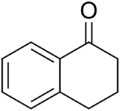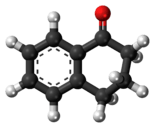1-Tetralone
 | |
 | |
| Names | |
|---|---|
| IUPAC name
3,4-Dihydro-2H-naphthalen-1-one | |
| Other names
α-Tetralone; 1-Tetralone | |
| Identifiers | |
| 529-34-0 | |
| ChemSpider | 10273 |
| |
| Jmol-3D images | Image |
| PubChem | 10724 |
| |
| Properties | |
| Molecular formula |
C10H10O |
| Molar mass | 146.19 g·mol−1 |
| Density | 1.099 g/mL |
| Melting point | 2 to 7 °C (36 to 45 °F; 275 to 280 K) |
| Boiling point | 113 to 116 (6 mmHg) |
| Except where noted otherwise, data is given for materials in their standard state (at 25 °C (77 °F), 100 kPa) | |
| | |
| Infobox references | |
1-Tetralone is an organic chemical compound with the molecular formula C10H10O. It is a common intermediate in organic synthesis. It is a ketone derivative of tetralin, a hydrogenated derivative of naphthalene. A related compound is 2-tetralone.
Preparation
1-Tetralone can be prepared by several methods. A typical methods involve intramolecular cyclisation of phenylbutyric acid.[2]
The Haworth reaction is a classic method for the synthesis of tetralone.[3][4] Benzene is reacted with succinic anhydride by a Friedel–Crafts acylation, the intermediate product is reduced and a second Friedel–Crafts acylation takes place upon the addition of acid.
 Haworth reaction
Haworth reaction
Use
1-Tetralone is a precursor to 1-naphthol by dehydrogenation:[5]
- C10H10O → C10H7OH + H2
References
- ↑ α-Tetralone at Sigma-Aldrich
- ↑ Cecil E. Olson, Alfred R. Bader, and G. Dana Johnson "α-Tetralone" Org. Synth. 1955, 35, 95. doi:10.15227/orgsyn.035.0095
- ↑ Robert Downs Haworth (1932). "Syntheses of alkylphenanthrenes. Part I. 1-, 2-, 3-, and 4-Methylphenanthrenes". J. Chem. Soc.: 1125. doi:10.1039/JR9320001125.
- ↑ Name Reactions: A Collection of Detailed Reaction Mechanisms By Jie Jack Li Published 2003 Springer ISBN 3-540-40203-9
- ↑ Gerald Booth "Naphthalene Derivatives" in Ullmann's Encyclopedia of Industrial Chemistry, 2005, Wiley-VCH, Weinheim. doi:10.1002/14356007.a17_009.